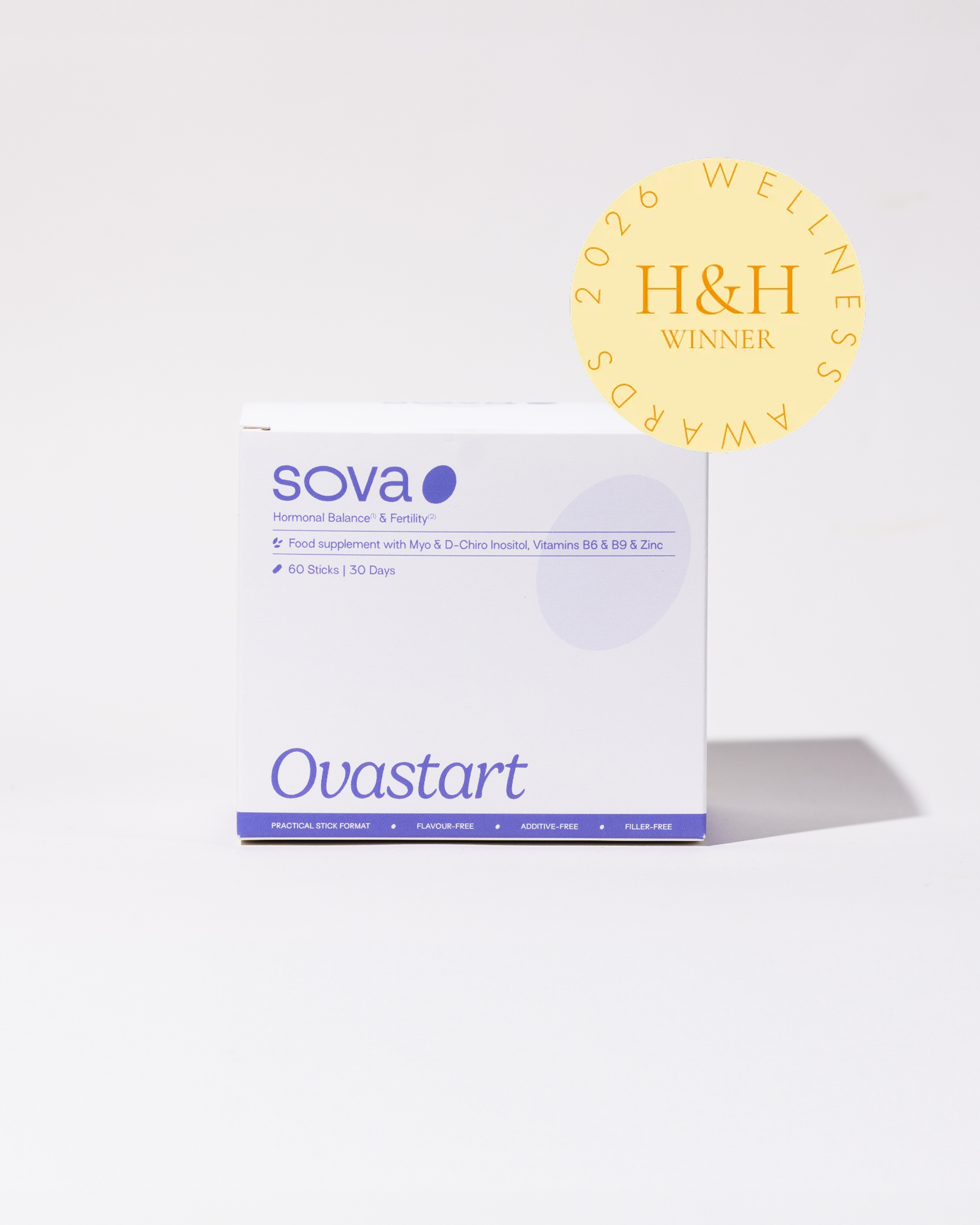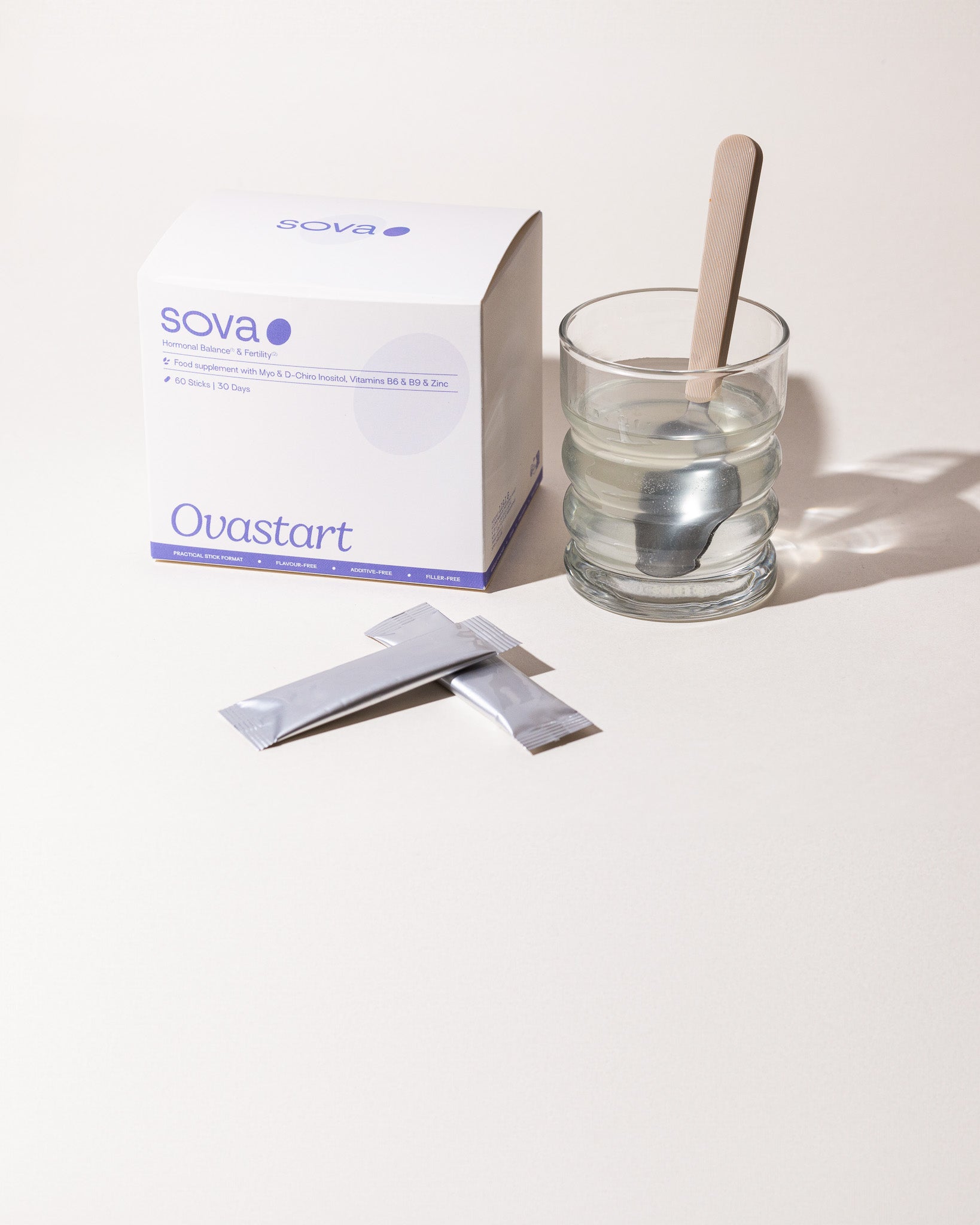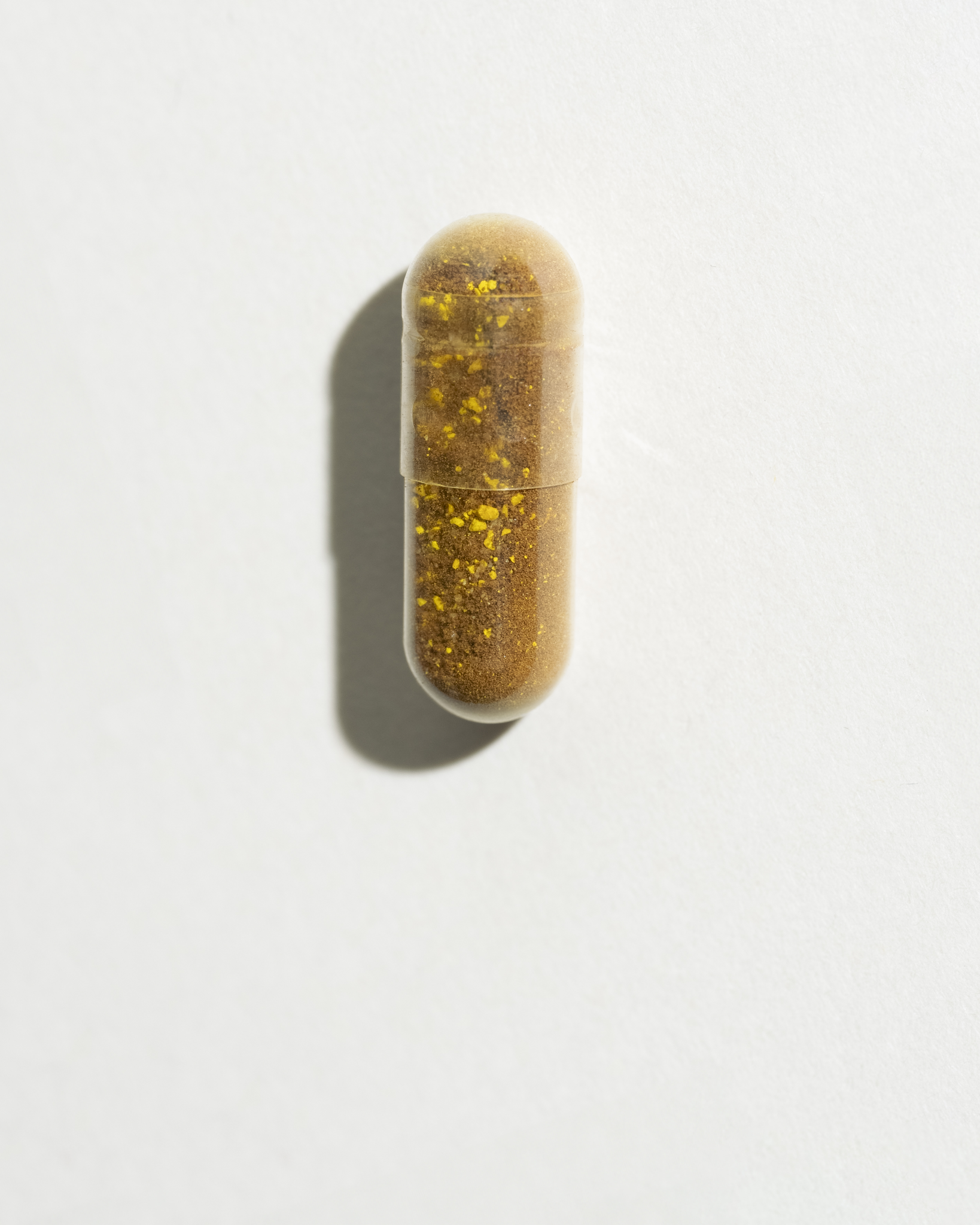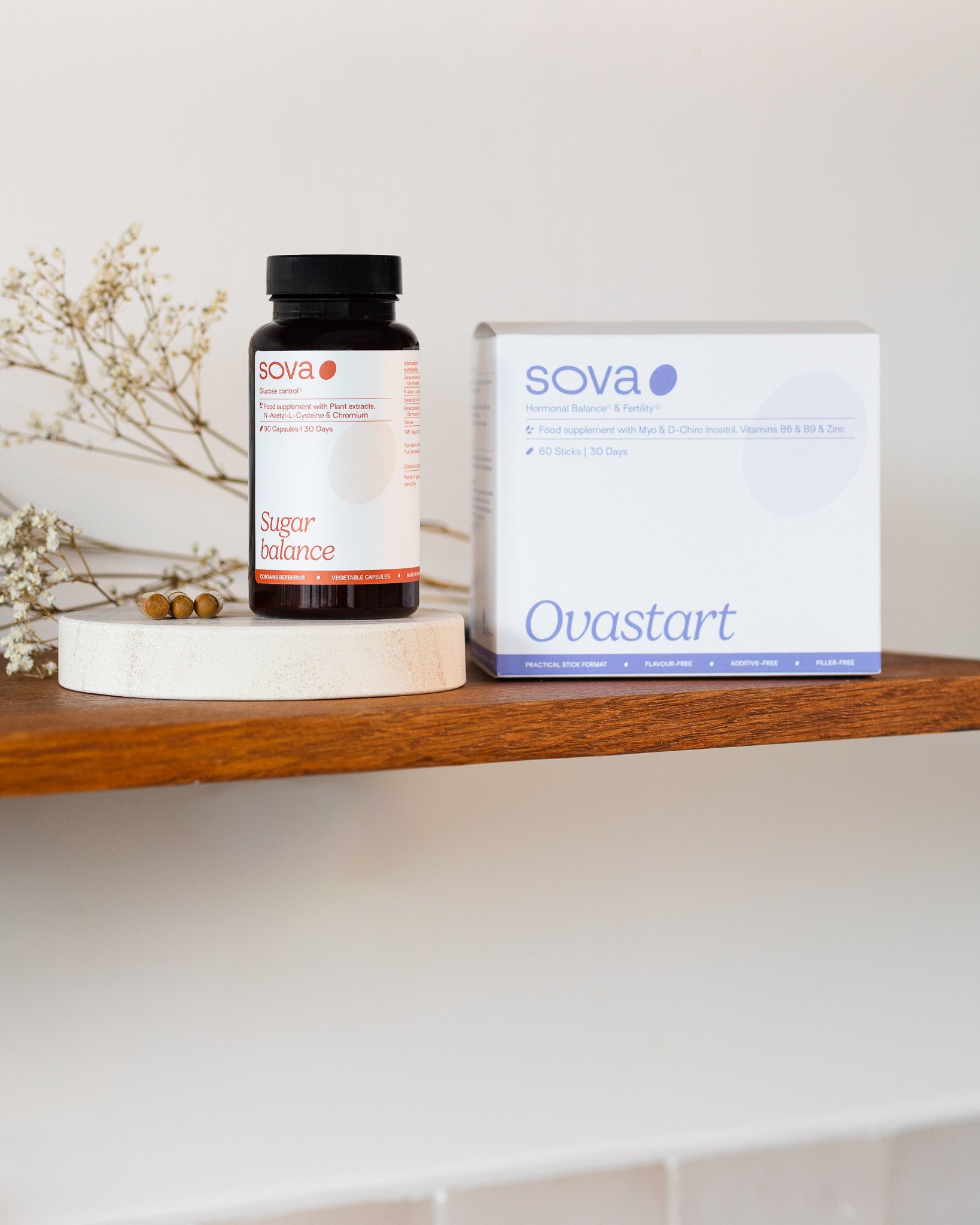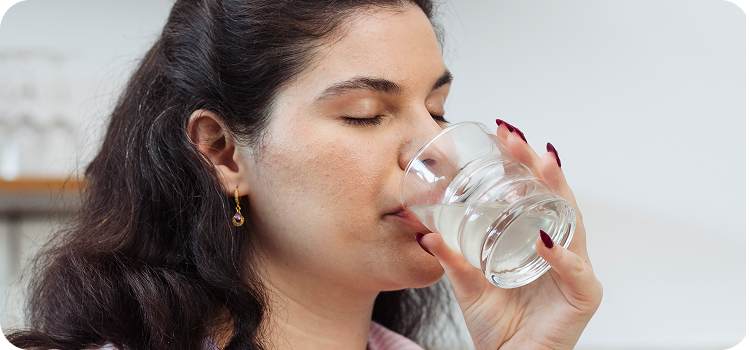Table of contents
Interesting supplements for PCOS
When managing PCOS, focusing on diet, sleep, stress management, and physical activities are all key to improving your health. But sometimes, you may feel like your body needs a little extra help. That's when dietary supplements come in handy!
Ideally, the supplement you choose should be specifically formulated for YOUR issue. When in doubt, we always recommend consulting a practitioner with experience in hormonal health or PCOS.
Micronutrients
Micronutrients are essential nutrients for a healthy body. This group includes vitamins (A, B, C, D, E, K), minerals (calcium, magnesium...), and trace elements (iron, zinc, chromium, iodine).
These are called "micronutrients" in contrast to "macronutrients," which are the nutrients in our diet providing us with daily energy: carbohydrates, fats, and proteins.
In this article, we’ll take you through the best and most useful micronutrients when dealing with PCOS.
Inositol
If you’re looking for THE star among PCOS-specific dietary supplements, look no further since it’s also the most studied. Initially mistaken for a vitamin, inositol was named as vitamin B7 upon its discovery. Today, we know that inositol belongs to the carbohydrate (sugar) family.
It is found throughout our diet, and the human body can normally synthesize it. However, when affected by Polycystic Ovary Syndrome (PCOS), this synthesis doesn't go according to plan. Studies have shown that women with PCOS have lower ovarian concentrations of inositol.
Inositol plays a crucial role in insulin secretion, which affects sugar regulation, and signal transmission between cells. Poor synthesis and utilization of inositol lead to improper insulin regulation, resulting in symptoms of hormonal imbalance. Additionally, it has been demonstrated that hyperinsulinemia leads to a deficiency of myo-inositol inside ovarian follicles.
Myo-inositol acts as a messenger for FSH (= hormone that stimulates follicle growth), and a lack of myo-inositol alters FSH secretion, affecting the proper maturation of ovarian follicles (source)
This mechanism can both delay ovulation (resulting in long and irregular cycles) and hinder egg quality (one reason why women with PCOS often experience poor egg quality).
Different forms of Inositol and the ideal ratio
The two most used forms of inositol in dietary supplements for PCOS are Myo‑inositol and D‑chiro‑inositol. Many studies reference a 40:1 ratio of these two forms, meaning 40 parts of myo‑inositol for every 1 part of D‑chiro‑inositol. However, this ratio is not as easy to find as you might think. Certain laboratories hold intellectual property rights on specific ratios, which makes it difficult for brands to reproduce them freely.
At SOVA, we chose to create a formulation that stays true to the research while remaining accessible and legally compliant. Each stick of Ovastart provides 1981 mg of myo‑inositol and 19 mg of D‑chiro‑inositol, along with active folate (Quatrefolic®), zinc, and vitamin B6. Even though the ratio differs slightly from the “classic” 40:1, the results speak for themselves – women using Ovastart report real improvements in their cycles, hormonal balance, and overall well‑being.
Magnesium
Magnesium is an essential mineral that supports hundreds of processes in the body – over 300 enzymatic reactions, to be exact.
In the UK, many women don’t get enough magnesium from their diet, and research shows that this shortfall can be even greater for women with PCOS. In fact, studies suggest they may be up to 19 times more likely to be magnesium deficient compared to those without PCOS (source).
Benefits of Magnesium for Women with PCOS
Magnesium offers numerous benefits to improve the quality of life for women with PCOS. A study conducted in 2022 evaluated various parameters such as emotional management, energy levels, and overall quality of life in 64 women with PCOS. The group of women who received magnesium supplementation showed significant improvements compared to the placebo group (source).
Magnesium also plays a crucial role in regulating blood sugar and insulin secretion. It directly influences glucose metabolism by acting as a cofactor for many enzymes involved in energy metabolism. Several studies have shown that a lower concentration of magnesium is associated with worsened insulin resistance and higher testosterone levels (source).
As a reminder, 70% of women with PCOS are affected by insulin resistance, so magnesium supplementation should be one of the first things you take after changing your diet (for more information on diet with PCOS, go here).
Forms and Dosage
Most studies have been conducted with doses ranging from 200 to 400 mg of magnesium. In the UK, the NHS considers that taking 400mg or less of magnesium per day is safe, as of the writing of this article.
Make sure to choose a readily absorbable form that won't cause digestive discomfort! Below is a small table to guide you:
| Well-Absorbed Forms ✅ | Less Well-Absorbed Forms 💩 |
|---|---|
| Magnesium bisglycinate | Magnesium oxide |
| Magnesium malate | Marine magnesium |
| Magnesium glycerophosphate | Magnesium citrate |
| Liposomal magnesium* | Magnesium chloride |
| Magnesium sulfate |
Vitamin D
Much more than just a vitamin, vitamin D behaves like a true hormone. It is so vital to the body that it is one of the very few vitamins the body can synthesize itself. It does it mainly under the action of sunlight (UVB rays) or through direct absorption (fatty fish, etc). Unfortunately, as of today, 1 in 6 adults in the UK have Vitamine D deficiency (source).
Vitamin D is essential for hormonal and immune system balance. It also contributes to the production of sex hormones, promoting a good level of progesterone in the postovulatory phase and early pregnancy.
Women with PCOS are particularly affected by vitamin D deficiencies: according to a study, 67 to 85% of women with PCOS have vitamin D levels below 20 ng/ml, placing them in a state of pronounced deficiency (source).
Furthermore, clear links between vitamin D levels and the issues faced by women with PCOS have also been established through various studies. For example, did you know that low levels of vitamin D are significantly correlated with insulin resistance? (source).
As a rule of thumb, low levels of vitamin D may exacerbate PCOS symptoms, including insulin resistance, ovulatory and menstrual irregularities, infertility, hyperandrogenism, obesity, and increase the risk of cardiovascular diseases (source).

Form and Dosage
Prioritize low-dose daily supplementation (around 2000 IU/day) rather than a loading dose every few weeks. Indeed, while high-dose ampoules quickly increase vitamin D concentration in the blood, they do not ensure sustained levels over the weeks. High-dose ampoules also have the negative effect of causing magnesium loss. Their use should be restricted to an initial loading dose if your levels are really very low. Your doctor will help you assess this!
Furthermore, try to choose vitamin D3 over D2 since our body does not use the latter effectively. Most of the time, vitamin D is derived from lanolin (i.e., sheep's wool). If you prefer a vegan form, look for products made from boreal lichen; it is currently the only recognized source of vegan vitamin D3.
In the UK the NHS recommends staying below the relatively safe level of 4 000 UI/day. They also advise people at risk of vitamin D deficiency such as us, women with PCOS, to take it throughout the year, rather than just through autumn and winter.
B-Vitamins
Vitamin B9
Vitamin B9, often called folic acid is crucial to produce our genetic material. It must be provided to our body as a dietary supplement during pregnancy since vitamin B9 deficiencies can lead to serious embryonic malformations,including "spina bifida".
Vitamin B9 is also an important supplement for women with PCOS who are often deficient. It helps lower our often too high homocysteine levels (an amino acid which may damage the lining of your arteries and create blood clots if present in excessive amounts).
You should preferably choose an active folate such as methylated vitamin B9 Quatrefolic® (used in Ovastart) to ensure adequate use from your body. Basic folic acid should be avoided!
Two other vitamins also play a crucial role with homocysteine: vitamins B6 and B12.
Vitamin B6
For example, vitamin B6 synergistically works with vitamins B9 and B12 to produce red blood cells. It also contributes to reducing fatigue and effective immune system function.
Vitamin B12
Supplementing with vitamin B12 is key if you consume few animal products as it is mostly found in meat and offal, fish, cheese, etc. A vitamin B12 deficiency can be harmful all the way up to nerve damage and motor difficulties in the most severe cases.
B-vitamin supplementation is even more critical if you are being treated with antidiabetic medications. For example, this study (source) demonstrated that while the most prescribed antidiabetic medication could contribute to elevated homocysteine levels, vitamin B1/B6/B12 and folic acid supplementation helped maintain lower homocysteine levels than when the antidiabetic was taken alone.
Similarly, if you are on oral contraceptives, it may be wise to seek advice from your medical practitioner to assess a potential deficiency and take adequate dietary supplements if necessary (source).

Zinc
Zinc is a trace element (i.e., a mineral present in small quantities in our bodies). Like magnesium, it is a key nutrient involved in hundreds of enzymatic reactions and is necessary for the proper functioning of our immune system. It helps us metabolize carbohydrates, lipids, and proteins and also plays a role in insulin synthesis (source).
Zinc plays a beneficial role in improving metabolic health — particularly in supporting blood sugar regulation and insulin secretion — which is especially important in the context of insulin resistance. This was demonstrated in a 2015 study involving 52 women with PCOS (source).
Zinc may also be beneficial when dealing with various pesky symptoms associated with PCOS. A 2016 study showed that zinc supplementation in women with PCOS had positive effects on both hirsutism (excessive body hair) and hair loss.
Dermatologists often use zinc for its positive effects on inflammatory acne. It is also a crucial mineral for fertility, preventing cell oxidation and playing a significant role in cell division and DNA synthesis. If you have PCOS and are planning a pregnancy, do think about supplementing with zinc!
Ovastart provides a gentle yet effective dose of zinc bisglycinate — a form that's both bioavailable and well tolerated.
Forms and Dosages
The safe dose recommended by the NHS is 25mg/day.
As was the case with magnesium, some formulations are better than others. A good and safe bet is zinc bisglycinate! Be cautious, though, if you are supplementing with iron. Indeed, zinc and iron are not compatible. Try to space them by at least 2 hours.
Ovastart provides a gentle yet effective dose of zinc bisglycinate — a form that's both bioavailable and well tolerated.
N-Acetylcysteine (NAC)
N-acetylcysteine (often abbreviated as NAC) is a powerful antioxidant very useful for PCOS. NAC has mucolytic properties, i.e., it thins out bodily secretions. For example, it is used in cases of bronchitis to thin mucus out and promote expectoration (source). As such, it would have an effect on follicular fluid, both helping to absorb the accumulation of follicles in the ovaries and facilitating ovulation.
NAC has shown very good results when combined with Clomid for women with PCOS trying to conceive. It also helps improve endometrial thickness (source). On the same principle, it can help boost the fertility of cervical mucus by making it more fluid and abundant. Finally, its antioxidant properties help improve the quality of oocytes by reducing inflammation markers that are often elevated in women with PCOS.
The beneficial effects of NAC are not limited to fertility, though. A study comparing the effectiveness of NAC vs. antidiabetic medication showed similar results (source). Also, NAC significantly improved insulin sensitivity (which is why it was included in our product Sugar Balance).
Studies have also detailed the benefits of NAC on hyperandrogenism: NAC supplementation can help reduce testosterone levels in women with PCOS. Elevated testosterone levels can cause symptoms such as acne, hirsutism, hair loss, etc. (source).
Dosage
Most studies have been conducted with 600mg of N-acetylcysteine, 1 to 3 times a day (max. 1800mg/day). NAC is generally well-tolerated, the only downside being the odor… In its purest form, expect a smell reminiscent of sulfur!
Chrome (Chromium)
Chromium is a trace element mostly used for its metabolism-regulating function as it increases insulin sensitivity and thus contributes to blood sugar regulation. It is often advised with type II diabetes (source).
A 2017 meta-analysis compiled several studies conducted on women with PCOS. Overall, most studies demonstrated chromium’s positive effect on fasting insulin, free testosterone levels, and Body Mass Index (BMI) (source).
Dosage
A safe dosage from the NHS is 10mg/day. Be cautious if you are pregnant or planning a pregnancy as the safe dose is lower in such cases. Chromium supplementation is not recommended if you are already on antidiabetic medication.

In conclusion
Of course, this list is not exhaustive, and there are many other micronutrients that can support women with PCOS. What matters most is starting with the foundations — a balanced diet, regular movement, stress management, and good sleep — and then building from there.
Dietary supplements should be there to support your body, not overwhelm you with dozens of bottles on your shelf. That’s why formulas that combine key ingredients backed by science can make things easier.
💡 Why our Formulas are built like this: a science-based summary
| Ingredient | Found in |
|---|---|
| Myo-inositol & D-chiro-inositol | Ovastart |
| Folic Acid (Quatrefolic®) | Ovastart |
| Zinc (Bisglycinate) | Ovastart |
| Vitamin B6 | Ovastart |
| Magnesium (Bisglycinate) | Coming soon – stay tuned! |
| Vitamin D3 | Coming soon – stay tuned! |
| Vitamin B12 | Not yet included |
| NAC (N-Acetylcysteine) | Sugar Balance |
| Berberine | Sugar Balance |
| Cinnamon Extract | Sugar Balance |
| Chromium | Sugar Balance |
✨ And if you’re looking for an all‑in‑one approach, the Balance Bundle combines both formulas: a simple, thoughtful way to cover the main needs identified in this article.
If in doubt, always consult your doctor or a nutrition‑aware healthcare professional before starting any supplement but know that the right formulation can be a real ally in making life with PCOS a little easier.
Warning
Dietary supplements should be used as part of a healthy lifestyle and should not be considered as substitutes for a diverse and balanced diet.
Do not exceed the recommended daily dosage.
- Dietary supplements : Products containing nutrients or bioactive compounds used to support specific physiological functions, such as hormonal balance, metabolism or stress response.
- Insulin resistance : A reduced cellular response to insulin, common in PCOS, which can influence hormone production, inflammation and weight regulation.
- Androgens : Hormones such as testosterone that are often elevated in PCOS and can contribute to acne, hair growth and cycle irregularities.
- Inflammation : A biological response that, when chronic, can worsen PCOS symptoms and metabolic balance.
Scientific references
SOVA was created by two sisters with PCOS who wanted products that truly worked. Our formulas are developed in-house with women’s health and micronutrition experts, using ingredients backed by clinical studies and compliant with European regulations.
- Built by women with PCOS, we know the reality of the symptoms.
- Clinically studied, high-quality ingredients, including patented forms like Quatrefolic® and an optimal Myo-/D-Chiro Inositol ratio.
- Holistic support for hormonal balance, metabolic health, inflammation, mood and cycle regulation.
- Transparent, science-led formulas with no unnecessary additives.
